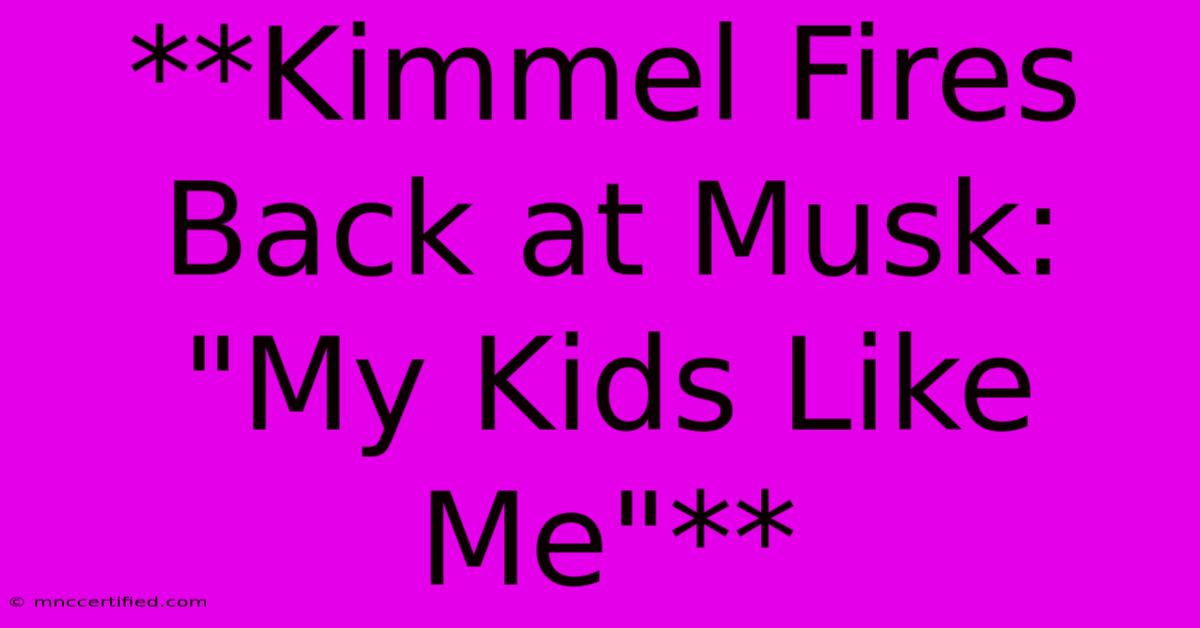**Kimmel Fires Back At Musk: "My Kids Like Me"**

Table of Contents
Kimmel Fires Back at Musk: "My Kids Like Me" - A Feud Fueled by Twitter
The latest celebrity spat to ignite the internet involves late-night host Jimmy Kimmel and tech mogul Elon Musk. The feud, sparked by Musk's recent acquisition of Twitter, has quickly become a public spectacle, fueled by both online commentary and traditional media outlets.
The Spark: A Tweet and a Joke
It all began with a tweet from Elon Musk, where he criticized Jimmy Kimmel's show for being "unfunny" and lacking in genuine humor. The billionaire tech CEO's tweet, which garnered significant attention and sparked a flurry of responses, was seemingly provoked by a segment on Kimmel's show that poked fun at Musk's recent Twitter takeover.
The segment, which featured a skit about Musk's new ownership of Twitter, depicted the tech mogul as a grumpy, out-of-touch figure struggling to navigate the social media platform. This light-hearted jab at Musk, seemingly intended for comedic effect, was taken seriously by the billionaire, igniting the public feud.
Kimmel's Retort: A Defense of His Family and His Work
Jimmy Kimmel, never one to shy away from a public showdown, swiftly responded to Musk's criticism with a retort that struck a chord with many viewers. He defended both his comedic work and his family, stating that his children, unlike Musk's, "like" him.
Kimmel's response, delivered during his late-night show, resonated with audiences for its sharp humor and pointed message. He subtly underscored the gap between Musk's perceived aloofness and his own relatable persona, building upon the "unfunny" critique and turning it into a humorous indictment of Musk's apparent disconnect with everyday life.
The Public Response: A Social Media Battleground
The feud between Kimmel and Musk quickly became a viral sensation, with fans and detractors alike taking sides on social media. Twitter, the platform at the heart of the controversy, became a battleground for pro-Kimmel and pro-Musk supporters.
The public response showcased the power of online discourse and the impact of celebrity feuds on social media. The battle between Kimmel and Musk offered a platform for commentary on a variety of topics, from the changing landscape of humor to the role of social media in shaping public perception.
Beyond the Twitter Feud: A Deeper Look at the Conflict
The Kimmel-Musk feud, while seemingly born out of a Twitter spat, reflects a broader societal conversation about wealth, power, and the influence of technology. Musk's acquisition of Twitter, a platform that shapes public discourse and influences global events, has sparked widespread debate about the role of billionaires in shaping online spaces.
Kimmel's response, though laced with humor, highlights the anxieties surrounding the growing influence of tech giants and the potential for them to control information flow. The comedian, through his public retort, offered a voice to those concerned about the concentration of power and the potential for online platforms to be used for personal gain.
Conclusion: A Spectacle of Entertainment and Social Commentary
The Kimmel-Musk feud, while seemingly driven by a personal vendetta, serves as a microcosm of broader social and political tensions. The online battle between the comedian and the tech billionaire has fueled a public discourse about the role of humor, the influence of technology, and the responsibility of powerful figures in a digital age.
The feud's impact extends beyond the realm of entertainment, highlighting the complex dynamics at play in the digital landscape. It serves as a reminder of the power of online spaces to shape narratives, fuel public debate, and influence the course of events.

Thank you for visiting our website wich cover about **Kimmel Fires Back At Musk: "My Kids Like Me"**. We hope the information provided has been useful to you. Feel free to contact us if you have any questions or need further assistance. See you next time and dont miss to bookmark.
Featured Posts
-
Chelsea Vs Noah Uefa Conference League Livestream
Nov 08, 2024
-
Health Insurance For Substitute Teachers
Nov 08, 2024
-
Shetland Back To Its Roots With New Lead
Nov 08, 2024
-
Herbstreit Mourns Loss Of Beloved Service Dog Ben
Nov 08, 2024
-
Great American Insurance Company Claims
Nov 08, 2024